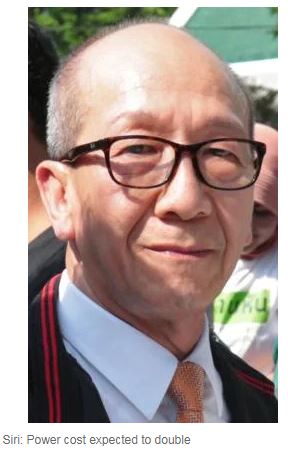Thailand: Crude palm oil for power considered
The Energy Ministry is considering using a surplus of crude palm oil this year to replace fossil fuels for power generation at two state-run plants in Chachoengsao and Ratchaburi.
 The tentative plan is to be implemented at Bang Pakong power plant, owned by the Electricity Generating Authority of Thailand (Egat), and Ratchaburi power plant, owned by Ratchaburi Electricity Generating Holding Plc, Egat’s subsidiary.
The tentative plan is to be implemented at Bang Pakong power plant, owned by the Electricity Generating Authority of Thailand (Egat), and Ratchaburi power plant, owned by Ratchaburi Electricity Generating Holding Plc, Egat’s subsidiary.
Energy minister Siri Jirapongphan said this plan would absorb 160,000 tonnes of crude palm oil.
The Office of Agricultural Economics reported the stock of crude palm oil as of September stood at 375,591 tonnes, higher than the normal level of 250,000 tonnes.
Thailand has produced 2.5 million tonnes of crude palm oil, with 900,000 tonnes going to vegetable oil for consumption and 1.3 million tonnes serving biodiesel for vehicles.
Mr Siri said the two power plants can shift from diesel and bunker oil to crude palm oil.
“Both state-run agencies have received the ministry’s order to use crude palm oil for power generation for three months,” he said. “But the two power plants have yet to announce when they will start using crude palm oil.”
Mr Siri said power generation cost is expected to double to 6-7 baht per kilowatt-hour (unit) from an average tariff at 3-3.2 baht per unit, but the ministry plans to offer a 1- billion-baht subsidy to maintain people’s power bills.
“The government will allocate 500 million baht and Egat will provide another 500 million baht,” he said.
This latest plan is a rehash of a move during the last surplus in 2016, when Egat was facing financial troubles.
Earlier, the ministry tied down oil traders with the announcement it was increasing the content of crude palm oil in biodiesel from 6.6% to 6.8% in a bid to curb slumping palm oil prices, effective from last Thursday.
Retail biodiesel, called B7, is blended with 6.6-7% methyl ester (ME).
The move is expected to absorb around 62,000-80,000 tonnes of crude palm oil.
Furthermore, the ministry has encouraged truck operators to use B20, blended with 20% ME, since July, projecting B20 consumption of 3 million litres a month.
The Energy Business Department reported B20 consumption in old trucks is undergoing a trial project with a volume of 7.7 million litres.
The Transport Ministry has already used B20 in a trial test for five public buses operated by the Bangkok Mass Transit Authority and three long-haul buses operated by Transport Co.
Transport Co plans to run the test for a month to forecast B20 consumption in the future.
“We expect to absorb a large volume of crude palm oil, up to 1.7 million tonnes a year once we can use B20 in public transport,” Mr Siri said.
The ministry set the B20 retail price below that of B7 by three baht a litre, and it is exempt from levies for the State Oil Fund.
Nonetheless, Whichai Phochanakij, director-general of Internal Trade Department, said the Commerce Ministry has measures to encourage palm oil exports of 525 million baht to subsidise transport costs at 1.75 baht per kilogramme.
“The ministry aims to export 300,000 tonnes of palm oil within five months, but it has to find new export markets to support this huge volume,” said Mr Whichai.
“The price of palm oil has dropped to 16 baht per kg, while Thai prices stand at 17-18 baht. The measures suggested are the best solution for the surplus.”
Source: https://www.bangkokpost.com/business/news/1570638/crude-palm-oil-for-power-considered


 English
English




